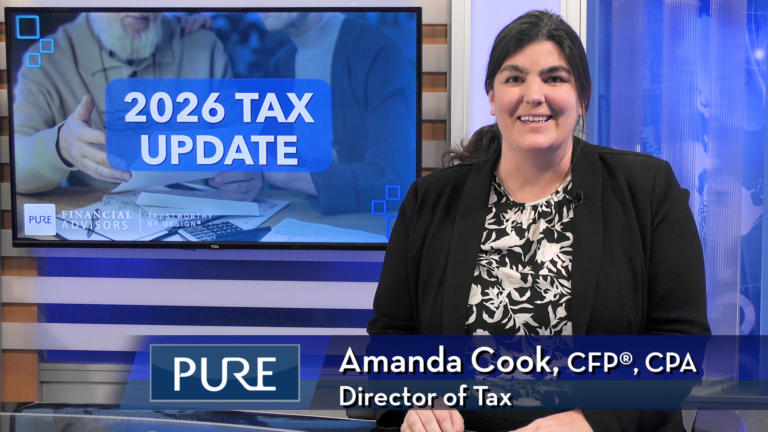Explore strategies for maximizing your Social Security payments based on your situation, whether you’re married, have children, or are eligible for survivor benefits. Pure’s Financial Planner, Maxwell Hacker, CFP®, reviews potential benefits providing insights into retirement planning and preparing for unforeseen circumstances. He’ll cover:
- Benefits for Your Spouse
- Benefits for Your Children
- Survivor Benefits
FREE GUIDE | Social Security Handbook
Transcript
If you’re getting Social Security retirement benefits, some members of your family may also qualify to receive benefits on your record. These Social Security payments to family members will not decrease the amount of your retirement benefit. Generally, the total amount you and your family can receive is about 150 to 180 percent of your full retirement benefit.
Benefits For Your Spouse
Even if they have never worked under Social Security, your spouse may be eligible for benefits if they are at least 62 years of age, and you are receiving retirement or disability benefits. It is important to note that you cannot file for a spousal benefit unless your spouse has already filed for their individual benefit as well.
At the spouse’s full retirement age, they’ll receive a monthly payment of up to one-half of your retirement benefit amount. Between age 62 and full retirement age, the amount is permanently reduced by a percentage based on the number of months up to their full retirement age. If your spouse qualifies for benefits on their own record, Social Security will pay that amount first. If the benefit on your record is higher, they will get an additional amount on your record so that the combination of benefits equals that higher amount. If your spouse is working while receiving benefits, the retirement earnings test may affect their benefits.
Benefits For Your Children
When you qualify for Social Security retirement benefits, your children may also qualify to receive benefits on your record and can receive up to half of the parent’s full retirement or disability benefits. Your eligible child can be your biological, adopted, or stepchild, dependent grandchild may also qualify, the child must be unmarried and under age 18 unless they are disabled.
Survivor Benefits
How much your family could receive in benefits depends on your average lifetime earnings. The higher your earnings were, the higher their benefits would be. If you are already receiving reduced benefits when you die, benefits for your surviving spouse may be affected.
Surviving spouses can receive reduced benefits as early as age 60. If surviving spouses qualify for retirement benefits on their own record, they can switch to their own retirement benefit as early as age 62. A surviving spouse, full retirement age or older will receive 100% of your benefit amount. A surviving spouse, age 60 to full retirement age will receive 71½ to 99% of your basic amount.
If your surviving spouse remarries before they reach age 60, they cannot receive benefits as a surviving spouse while they’re married. If the remarry after they reach age 60, they will continue to qualify for benefits on your Social Security record. Your unmarried children who are under age 18 can be eligible to receive Social Security benefits when you die. If a child receives survivor benefits, they can get up to 75% of the deceased parent’s basic Social Security benefit.
Understanding Social Security benefits is key in planning for retirement or unexpected loss. If you would like to review your benefits to determine your options, contact Pure Financial Advisors for a complimentary consultation.
Subscribe to our YouTube channel.
IMPORTANT DISCLOSURES:
• Investment Advisory and Financial Planning Services are offered through Pure Financial Advisors, LLC, a Registered Investment Advisor.
• Pure Financial Advisors LLC does not offer tax or legal advice. Consult with your tax advisor or attorney regarding specific situations.
• Opinions expressed are subject to change without notice and are not intended as investment advice or to predict future performance.
• Investing involves risk including the potential loss of principal. No investment strategy can guarantee a profit or protect against loss in periods of declining values.
• All information is believed to be from reliable sources; however, we make no representation as to its completeness or accuracy.
• Intended for educational purposes only and are not intended as individualized advice or a guarantee that you will achieve a desired result. Before implementing any strategies discussed you should consult your tax and financial advisors.
• Pure Financial Advisors, LLC, is not affiliated with any government agency, including, but not limited to the Social Security Administration.
CFP® – The CERTIFIED FINANCIAL PLANNER™ certification is by the Certified Financial Planner Board of Standards, Inc. To attain the right to use the CFP® designation, an individual must satisfactorily fulfill education, experience and ethics requirements as well as pass a comprehensive exam. Thirty hours of continuing education is required every two years to maintain the designation.













